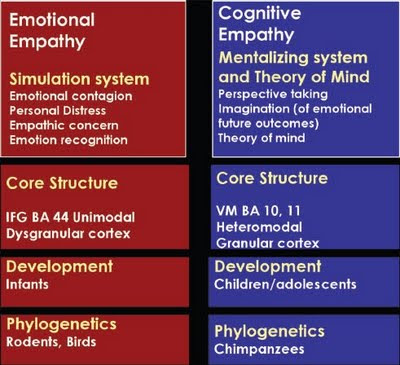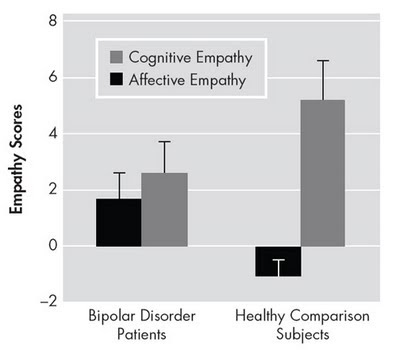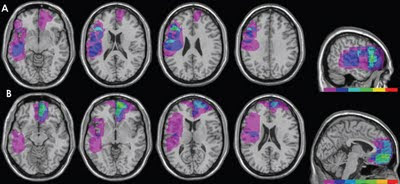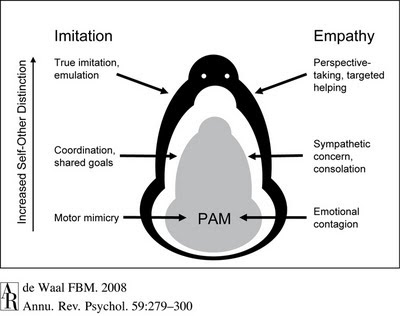Neuroscience
Cognitive empathy, or the ability to take another person's perspective, is closely related to (or even synonymous with) theory of mind,

Fig. 6 (Shamay-Tsoory et al., 2009a). Two separate systems for emotional and cognitive based empathy. Behaviourally, emotional empathy involves personal distress, empathic concern and emotion recognition. Anatomically the IFG [inferior frontal gyrus] appears to be responsible for emotional empathy. ... Cognitive empathy, on the other hand, involves perspective taking, the fantasy scale and theory of mind and is mediated by the VM [ventromedial prefrontal cortex].
Individuals with bipolar disorder can show deficits in social cognition and emotion regulation even in the euthymic (remitted) state (Green et al., 2007). These observation led Shamay-Tsoory et al. (2009b) to examine cognitive and emotional empathy in 19 euthymic patients with bipolar disorder and 20 matched control participants:
The results indicated that the participants with bipolar disorder had lower scores than controls for cognitive empathy, but higher scores for emotional empathy.

Figure 1 (Shamay-Tsoory et al. (2009b). Participant Empathy Scores.
A similar effect was observed in the faux pas task, with the patients impaired on cognitive understanding, but not in affective understanding or in recognition of the faux pas. This agrees with prior studies on theory of mind in bipolar disorder (Malhi et al., 2008; Montag et al., 2009). On the other hand, the bipolar individuals showed completely intact performance on recognizing emotion in the eyes and in the spatial planning task. However, they had difficulty in set shifting and reversal learning in the cognitive flexibility task. And greater difficulty with reversal learning was associated with lower cognitive empathy scores, suggesting that cognitive inflexibility contributes to the deficiency in taking another's perspective.
What does this mean?

Fig. 2 (Shamay-Tsoory et al., 2009a). Group and task (cognitive versus emotional empathy) interactions. Significant interaction between group and empathy type. Patients with VM lesions were impaired in cognitive empathy compared to the healthy controls (HC), patients with posterior lesions (PC) and patients with IFG lesions whereas patients with IFG lesions were impaired in emotional empathy compared to the HC, VM and the PC group.
As with most things, though, the anatomical dissociation wasn't completely clean; there was some degree of overlap, as shown below.
 Fig. 5 (Shamay-Tsoory et al., 2009a). Location and overlap of brain lesions according to emotional versus cognitive empathy impairment-groups. (A) Lesions of the emotional-empathy-impaired group (n=6). Four patients had an IFG damage involving [Brodmann] area 44, one had a VM damage and one had a PC damage. Chi-square analysis revealed that lesions involving area 44 were significantly more frequent in this group as compared to the non-impaired group. (B) Lesions of the cognitive-empathy-impaired group (n=7): five had VM damage involving area 10 and 11, one had an IFG damage and one had a PC damage. Chi-square analysis revealed that lesions involving area 10 and area 11 were significantly more frequent in this group as compared to the non-impaired group.
Fig. 5 (Shamay-Tsoory et al., 2009a). Location and overlap of brain lesions according to emotional versus cognitive empathy impairment-groups. (A) Lesions of the emotional-empathy-impaired group (n=6). Four patients had an IFG damage involving [Brodmann] area 44, one had a VM damage and one had a PC damage. Chi-square analysis revealed that lesions involving area 44 were significantly more frequent in this group as compared to the non-impaired group. (B) Lesions of the cognitive-empathy-impaired group (n=7): five had VM damage involving area 10 and 11, one had an IFG damage and one had a PC damage. Chi-square analysis revealed that lesions involving area 10 and area 11 were significantly more frequent in this group as compared to the non-impaired group.
Nonetheless, such human lesion studies can demonstrate the importance of specific brain areas for the cognitive or emotional processes in question, thereby illuminating the underlying neural network abnormalities in psychiatric disorders.
References
Baron-Cohen S, O'Riordan M, Stone V, Jones R, Plaisted K. (1999). Recognition of faux pas by normally developing children and children with Asperger syndrome or high-functioning autism. J Autism Dev Disord. 29:407-18.
Green MJ, Cahill CM, Malhi GS. (2007). The cognitive and neurophysiological basis of emotion dysregulation in bipolar disorder. J Affect Disord. 103(1-3):29-42.
Malhi GS, Lagopoulos J, Das P, Moss K, Berk M, Coulston CM. (2008). A functional MRI study of Theory of Mind in euthymic bipolar disorder patients. Bipolar Disord. 10:943-56.
Montag C, Ehrlich A, Neuhaus K, Dziobek I, Heekeren HR, Heinz A, Gallinat J. (2009). Theory of mind impairments in euthymic bipolar patients. J Affect Disord. Sep 12. [Epub ahead of print].

Shamay-Tsoory, S., Aharon-Peretz, J., & Perry, D. (2009a). Two systems for empathy: a double dissociation between emotional and cognitive empathy in inferior frontal gyrus versus ventromedial prefrontal lesions. Brain, 132 (3), 617-627 DOI: 10.1093/brain/awn279
Shamay-Tsoory, S., Harari, H., Szepsenwol, O., & Levkovitz, Y. (2009b). Neuropsychological Evidence of Impaired Cognitive Empathy in Euthymic Bipolar Disorder. Journal of Neuropsychiatry, 21 (1), 59-67 DOI: 10.1176/appi.neuropsych.21.1.59

Figure 2 (de Waal, 2008). The Russian doll model of empathy and imitation. Empathy (right) induces a similar emotional state in the subject and the object, with at its core the perception-action mechanism (PAM). The doll's outer layers, such as sympathetic concern and perspective-taking, build upon this hard-wired socio-affective basis. Sharing the same mechanism, the doll's imitation side (left) correlates with the empathy side. Here, the PAM underlies motor mimicry, coordination, shared goals, and true imitation. Even though the doll's outer layers depend on prefrontal functioning and an increasing self-other distinction, these outer layers remain connected to its inner core.
- Simon Baron-cohen, Empathy, And The Atrocities In Afghanistan
From Rolling Stone Magazine An excerpt from Simon-Baron Cohen's new book, Zero Degrees of Empathy: a New Theory of Human Cruelty, appeared as The science of empathy in the Guardian. Overall, the writing revealed him to be unempathetic in some respects,...
- Regarding The Pain Of Others
That's the title of a book (2003, Farrar, Straus & Giroux) by the late Susan Sontag. ''Let the atrocious images haunt us. Even if they are only tokens, and cannot possibly encompass most of the reality to which they refer, they still...
- Misery And Empathy
In Misery, a horror tale by Stephen King, Annie [the unbalanced "number one fan" of Paul Sheldon's romance novels] rescues the injured Sheldon from a car accident and seizes the opportunity to nurse her favorite writer back to health, but her...
- Neuropsychology Abstract Of The Day: Assessment Of Social Cognition In Tbi
An active area of test development and research in contemporary clinical neuropsychology: Social Cognition Impairments in Relation to General Cognitive Deficits, Injury Severity and Prefrontal Lesions in Traumatic Brain Injury Patients. Journal of Neurotrauma....
- Neuropsychology Abstract Of The Day: Parietal Function
Haramati S, Soroker N, Dudai Y, & Levy DA. The posterior parietal cortex in recognition memory: A neuropsychological study. Neuropsychologia. 2007 Nov 29 [Epub ahead of print] Department of Neurobiology, Weizmann Institute of Science, P.O. Box 26, Rehovot...
Neuroscience
Impaired Cognitive Empathy in Bipolar Disorder and in Patients with Ventromedial Prefrontal Lesions
Cognitive empathy, or the ability to take another person's perspective, is closely related to (or even synonymous with) theory of mind,
...the ability to attribute mental states—beliefs, intents, desires, pretending, knowledge, etc.—to oneself and others and to understand that others have beliefs, desires and intentions that are different from one's own.On the other hand, emotional or affective empathy is "emotional contagion" - the ability to mirror an emotional response observed in another person and to experience it vicariously. Dr. Simone Shamay-Tsoory and colleagues (2009a) have developed a model that distinguishes between the two types of empathy, which are represented by separate neuroanatomical systems (see figure below).

Fig. 6 (Shamay-Tsoory et al., 2009a). Two separate systems for emotional and cognitive based empathy. Behaviourally, emotional empathy involves personal distress, empathic concern and emotion recognition. Anatomically the IFG [inferior frontal gyrus] appears to be responsible for emotional empathy. ... Cognitive empathy, on the other hand, involves perspective taking, the fantasy scale and theory of mind and is mediated by the VM [ventromedial prefrontal cortex].
Individuals with bipolar disorder can show deficits in social cognition and emotion regulation even in the euthymic (remitted) state (Green et al., 2007). These observation led Shamay-Tsoory et al. (2009b) to examine cognitive and emotional empathy in 19 euthymic patients with bipolar disorder and 20 matched control participants:
The cognitive and affective aspects of empathic abilities were assessed using the Interpersonal Reactive Index. The Interpersonal Reactive Index includes four seven-item subscales, each tapping a different aspect of empathy: (a) the perspective taking subscale, which measures the reported tendency to adopt spontaneously the psychological point of view of others; (b) the fantasy subscale, measuring the tendency to imaginatively transpose oneself into fictional situations; (c) the empathic concern scale, measuring the tendency to experience feelings of sympathy and compassion for others; and (d) the personal distress scale assesses the tendency to experience distress and discomfort in response to others’ observed distress.The perspective-taking subscale was used as a measure of cognitive empathy, and the personal distress scale was used as a measure of emotional empathy. To assess theory of mind, the ability to detect faux pas was examined using a set of stories developed by Baron-Cohen et al. (1999). For example:
James bought Richard a toy airplane for his birthday. A few months later, they were playing with it, and James accidentally dropped it. "Don't worry" said Richard, "I never liked it anyway. Someone gave it to me for my birthday."Questions after each faux pas and control passage assessed story comprehension, false belief (i.e., the speaker had a mistaken belief and not malicious intent), faux pas detection, and specific identification of the faux pas. Also tested were recognition of emotional expressions from the eyes, cognitive flexibility, and spatial planning abilities.
The results indicated that the participants with bipolar disorder had lower scores than controls for cognitive empathy, but higher scores for emotional empathy.

Figure 1 (Shamay-Tsoory et al. (2009b). Participant Empathy Scores.
A similar effect was observed in the faux pas task, with the patients impaired on cognitive understanding, but not in affective understanding or in recognition of the faux pas. This agrees with prior studies on theory of mind in bipolar disorder (Malhi et al., 2008; Montag et al., 2009). On the other hand, the bipolar individuals showed completely intact performance on recognizing emotion in the eyes and in the spatial planning task. However, they had difficulty in set shifting and reversal learning in the cognitive flexibility task. And greater difficulty with reversal learning was associated with lower cognitive empathy scores, suggesting that cognitive inflexibility contributes to the deficiency in taking another's perspective.
What does this mean?
The present study results suggest that [the likelihood to engage in the process of reflecting on the viewpoint of others] is impaired in bipolar disorder. On the second affective scale, personal distress, the bipolar disorder group actually scored significantly higher than healthy comparison subjects... This indicates a greater tendency to have self-oriented feelings of anxiety and discomfort in response to tense interpersonal settings........[Their] exaggerated emotional response to others may be expressed in a dysfunctional empathic emotional overreaction (or “hyper empathy”).This notion is consistent with the “simulation” theory, according to which individuals impersonate others’ emotional mental states, using their own mental state. Thus, it may be hypothesized that bipolar disorder patients tend to engage in the “oversimulation” of others’ emotions, as reflected in high affective empathy, and as a result, they tend to misinterpret others’ mental states, which is reflected in impaired cognitive empathy and theory of mind.What are the brain systems that mediate such difficulties in those with bipolar disorder? Returning to the model in Figure 6 (above), Shamay-Tsoory et al. (2009a) associated emotional empathy with the inferior frontal gyrus (IFG) and cognitive empathy with ventromedial prefrontal cortex (VM). How did they determine such a clear dissociation? This was from another experiment that administered the same set of tests to a different population: neurological patients with fairly discrete lesions in each of those brain areas.

Fig. 2 (Shamay-Tsoory et al., 2009a). Group and task (cognitive versus emotional empathy) interactions. Significant interaction between group and empathy type. Patients with VM lesions were impaired in cognitive empathy compared to the healthy controls (HC), patients with posterior lesions (PC) and patients with IFG lesions whereas patients with IFG lesions were impaired in emotional empathy compared to the HC, VM and the PC group.
As with most things, though, the anatomical dissociation wasn't completely clean; there was some degree of overlap, as shown below.
 Fig. 5 (Shamay-Tsoory et al., 2009a). Location and overlap of brain lesions according to emotional versus cognitive empathy impairment-groups. (A) Lesions of the emotional-empathy-impaired group (n=6). Four patients had an IFG damage involving [Brodmann] area 44, one had a VM damage and one had a PC damage. Chi-square analysis revealed that lesions involving area 44 were significantly more frequent in this group as compared to the non-impaired group. (B) Lesions of the cognitive-empathy-impaired group (n=7): five had VM damage involving area 10 and 11, one had an IFG damage and one had a PC damage. Chi-square analysis revealed that lesions involving area 10 and area 11 were significantly more frequent in this group as compared to the non-impaired group.
Fig. 5 (Shamay-Tsoory et al., 2009a). Location and overlap of brain lesions according to emotional versus cognitive empathy impairment-groups. (A) Lesions of the emotional-empathy-impaired group (n=6). Four patients had an IFG damage involving [Brodmann] area 44, one had a VM damage and one had a PC damage. Chi-square analysis revealed that lesions involving area 44 were significantly more frequent in this group as compared to the non-impaired group. (B) Lesions of the cognitive-empathy-impaired group (n=7): five had VM damage involving area 10 and 11, one had an IFG damage and one had a PC damage. Chi-square analysis revealed that lesions involving area 10 and area 11 were significantly more frequent in this group as compared to the non-impaired group.Nonetheless, such human lesion studies can demonstrate the importance of specific brain areas for the cognitive or emotional processes in question, thereby illuminating the underlying neural network abnormalities in psychiatric disorders.
References
Baron-Cohen S, O'Riordan M, Stone V, Jones R, Plaisted K. (1999). Recognition of faux pas by normally developing children and children with Asperger syndrome or high-functioning autism. J Autism Dev Disord. 29:407-18.
Green MJ, Cahill CM, Malhi GS. (2007). The cognitive and neurophysiological basis of emotion dysregulation in bipolar disorder. J Affect Disord. 103(1-3):29-42.
Malhi GS, Lagopoulos J, Das P, Moss K, Berk M, Coulston CM. (2008). A functional MRI study of Theory of Mind in euthymic bipolar disorder patients. Bipolar Disord. 10:943-56.
Montag C, Ehrlich A, Neuhaus K, Dziobek I, Heekeren HR, Heinz A, Gallinat J. (2009). Theory of mind impairments in euthymic bipolar patients. J Affect Disord. Sep 12. [Epub ahead of print].

Shamay-Tsoory, S., Aharon-Peretz, J., & Perry, D. (2009a). Two systems for empathy: a double dissociation between emotional and cognitive empathy in inferior frontal gyrus versus ventromedial prefrontal lesions. Brain, 132 (3), 617-627 DOI: 10.1093/brain/awn279
Shamay-Tsoory, S., Harari, H., Szepsenwol, O., & Levkovitz, Y. (2009b). Neuropsychological Evidence of Impaired Cognitive Empathy in Euthymic Bipolar Disorder. Journal of Neuropsychiatry, 21 (1), 59-67 DOI: 10.1176/appi.neuropsych.21.1.59

Figure 2 (de Waal, 2008). The Russian doll model of empathy and imitation. Empathy (right) induces a similar emotional state in the subject and the object, with at its core the perception-action mechanism (PAM). The doll's outer layers, such as sympathetic concern and perspective-taking, build upon this hard-wired socio-affective basis. Sharing the same mechanism, the doll's imitation side (left) correlates with the empathy side. Here, the PAM underlies motor mimicry, coordination, shared goals, and true imitation. Even though the doll's outer layers depend on prefrontal functioning and an increasing self-other distinction, these outer layers remain connected to its inner core.
- Simon Baron-cohen, Empathy, And The Atrocities In Afghanistan
From Rolling Stone Magazine An excerpt from Simon-Baron Cohen's new book, Zero Degrees of Empathy: a New Theory of Human Cruelty, appeared as The science of empathy in the Guardian. Overall, the writing revealed him to be unempathetic in some respects,...
- Regarding The Pain Of Others
That's the title of a book (2003, Farrar, Straus & Giroux) by the late Susan Sontag. ''Let the atrocious images haunt us. Even if they are only tokens, and cannot possibly encompass most of the reality to which they refer, they still...
- Misery And Empathy
In Misery, a horror tale by Stephen King, Annie [the unbalanced "number one fan" of Paul Sheldon's romance novels] rescues the injured Sheldon from a car accident and seizes the opportunity to nurse her favorite writer back to health, but her...
- Neuropsychology Abstract Of The Day: Assessment Of Social Cognition In Tbi
An active area of test development and research in contemporary clinical neuropsychology: Social Cognition Impairments in Relation to General Cognitive Deficits, Injury Severity and Prefrontal Lesions in Traumatic Brain Injury Patients. Journal of Neurotrauma....
- Neuropsychology Abstract Of The Day: Parietal Function
Haramati S, Soroker N, Dudai Y, & Levy DA. The posterior parietal cortex in recognition memory: A neuropsychological study. Neuropsychologia. 2007 Nov 29 [Epub ahead of print] Department of Neurobiology, Weizmann Institute of Science, P.O. Box 26, Rehovot...
